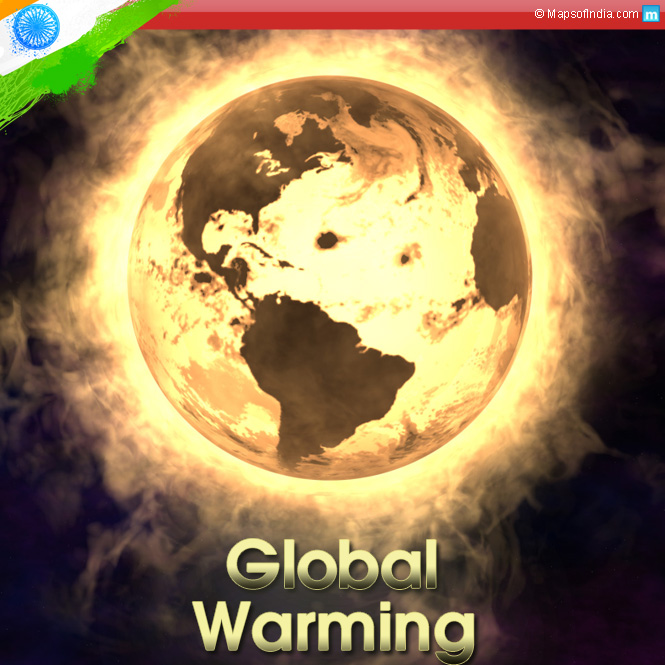Scientists all across the world are persistently working to figure out the exact cause of global warming and find ways to slow down the damage. They have found out that along with natural events, humans are again the major drivers of global warming. Their activities emit numerous gases which are accountable for global warming and greenhouse effect. These include combustion of fuel in vehicles, factories and even the production of electricity. Of all, carbon dioxide is causing most of the harm. CO2 is absorbed by trees and forests but we are cutting down the forests. In pre-industrial era the total forest cover on the earth was 5.9 billion hectares but it has reduced to 4 billion hectares now. Deforestation was at its peak in the 1990s and now also the world’s forest cover is declining at a fast pace.
Forest cover in Africa reduced from 749 million hectares to 674 million hectares during the period between 1990 and 2010. In North and Central America the reduction was from 708 to 705 million hectares, in South America it was from 946 to 864 million hectares. During the period the total forest cover in the world reduced from 4,168 million hectares to 4,033 million hectares.
Our earth is a very special planet as it is the only known planet to have life. Greenhouse gases wrap the earth like blanket and do not allow Sun’s heat to go back. These gases also protect the earth from becoming extra cold due to the cold waves of the universe. But the percentage of greenhouse gases, especially CO2, is increasing, leading to a warmer earth. The burning of fossil fuels like coal, natural gas and oil release CO2.
Methane gas released from landfills and agriculture is also responsible for global warming and one of the byproducts of human activity. Most of the industrial processes, refrigeration and fertilizers emit gases which are harmful to our environment and contribute to the warming and climate change.
As per a study conducted by the Concordia University, the contribution of seven countries (United States, China, Russia, Brazil, India, Germany and the United Kingdom) is more than 60 percent in the anthropogenic global warming that happened before 2005. (Anthropogenic global warming is a theory stating that human beings are responsible for most of the global warming)
How It Works?
The molecules of greenhouse gases absorb heat and results in a warm atmosphere. So if there is an increase in the greenhouse gases, more heat will be absorbed resulting in a warmer climate. Major greenhouse gases (GHG) are – water vapor, carbon dioxide (CO2), methane (CH4), nitrous oxide (N2O), ozone (O3) and chlorofluorocarbons (CFCs).
A molecule of methane can absorb more heat than CO2 and has the ability to warm the atmosphere 20 times more than a CO2 molecule. Nitrous oxide is 300 times stronger than CO2, chlorofluorocarbons (which has been banned) has thousand times more ability than CO2 to absorb heat. But their concentration in the atmosphere as compared to CO2 is too low. Hence, the major contributing gas in global warming is still CO2.
Consequences of Global Warming
An increase of more than 1°F (0.7°C) has been noticed in the global average temperature over the last century. During the period between 1961 and 2003, an increase of 0.10 °C has been recorded in the global ocean temperature from the surface to a depth of 700 m.
- It has been projected that global warming will increase the sea level and will have many other catastrophic effects like droughts, floods, heat and storms. It will disturb the ecosystem of the earth.
- Global warming will decrease the snow cover in the northern hemisphere.
- It will lead to extreme weather. In future the earth will have more hot days and fewer cold days.
- With a change in climate, agriculture and food production will also get impacted. Crop yield in low altitude regions will decline. There will be modified weeds, pests and pathogens.
- According to a study conducted by the World Health Organization (WHO, 2009), climate change will impact human health. In 2004, climate change had resulted in 3% of diarrhoea, 3% of malaria and 3.8% of dengue fever deaths across the world.
- Sea level rise will decrease the availability of fresh water.
How Can I Contribute to Reducing Global Warming?
- Our activities like driving cars, heating homes and using refrigerators contribute to global warming. But we can control our requirements and save ourselves from the damage to a great extent.
- We must use energy efficient appliances at home. Look for appliances having ENERGY STAR label. The Bureau of Energy Efficiency (BEE) gives rating to appliances from one to five. The rating is based upon how well these appliances fulfil the standard criteria. Buying a 250 litre refrigerator with five rating can save Rs 2,000 also.
- Water must be used efficiently. Most common wastage is during shaving and brushing teeth. Also irrigate your lawn only when it is required, not every day.
- If possible, use public transport for commuting to office.
- Always buy fuel efficient vehicles. Your vehicle must undergo a regular maintenance check for efficiency. Keep tier pressure at optimum level. Under-inflated tyres reduce the efficiency and emit more greenhouse gases.
- We must plant more trees.





